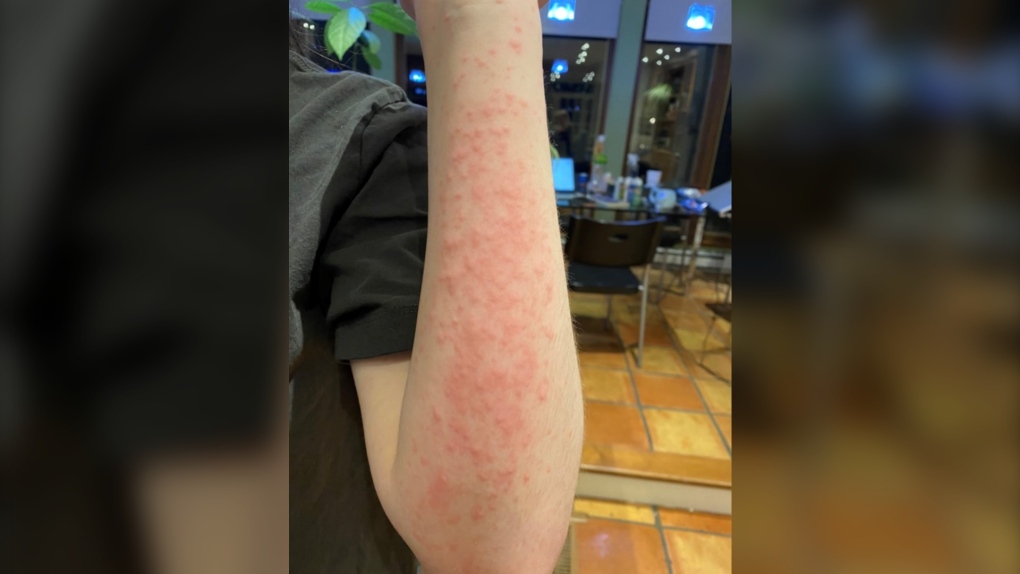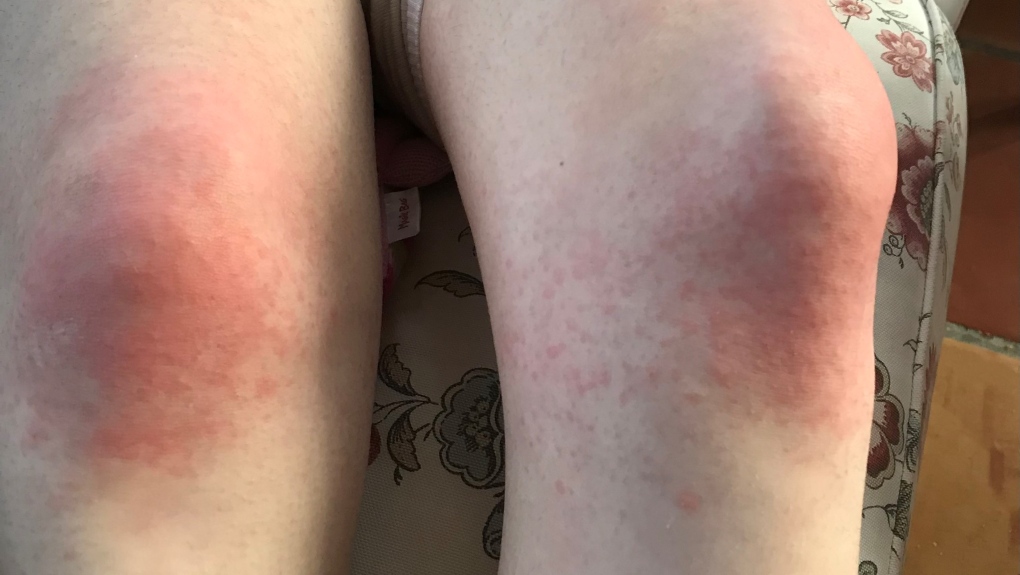Think you hate the cold? Meet the Montreal girl who's 'allergic' to it
Eryn Margolese’s routine before going outside this time of year would sound familiar to a lot of Montrealers.
“Depending on how cold it is, I'll wear two pairs of pants,” says the 15-year-old. “And I'll always wear, like, long sleeves, jackets, hat, gloves, scarves—everything.”
Nobody likes to be cold. But for Margolese, it’s not quite the same thing.
In 2020, she started getting a strange rash at odd times: raised, itchy red bumps on her skin that could take hours to go away. She tried to ignore it.
“I didn’t really know what was happening,” she said. “I just had some rash, and I was like ‘OK, that’s weird,’ and then it kept happening and I had no idea what it was.”
Finally, she went to “a bunch of doctors” and they tried to help. Maybe it was a kind of soap or laundry detergent she was reacting to, they theorized. But she hadn’t been using any new products.

Finally, an allergist at the Montreal Children’s Hospital had a new idea.
Dr. Moshe Ben-Shoshan took an ice cube and put it on Margolese’s arm. The rash quickly appeared, and he knew exactly what the problem was.
In such “ice cube tests,” he explained, “we wait five minutes and then we observe the development of hives aftewards.”
Margolese had come with a story he recognized, he said—“a classic story of going swimming or going outside in cold weather and developing hives.”
He broke the news to her: she was allergic to chilly temperatures, more or less, with a condition called cold urticaria. It’s not exactly an allergy, but a reaction to cold that looks a lot like an allergy and can even produce life-threatening anaphylaxis.
It affects about 30,000 Canadians, most of them young people, Ben-Shoshan told CTV News.
“Any one of us will get redness where we put the ice cube, but this patient will get hives,” he said.
“It looks like an allergy because you get the hives. But the trigger is not an allergen like peanut or… pollen,” he said.
“Basically the exposure to cold is assumed to generate an auto-allergen, so a substance that your immune system reacts to.”
Doctors are still trying to understand the condition, but it’s the substance produced within the sufferers’ bodies that creates the skin reaction.
“When you think about an allergy, you try to look for an external trigger that you can remove from your environment, like you know, a food… or a cat or a dog,” the doctor explained.
“This is different," he said. "In order to control it you need to control your internal environment by keeping your temperature warmer, by protecting your exposed surface areas, by taking antihistamines and in cases that are more severe,” having an epinephren injector.

For Margolese, the news was hard to hear. One of her main triggers wasn’t winter weather, but being at summer camp and swimming or boating every day in a cold lake, which she loved.
Now, she can’t do that the same way. She has to wade slowly in and pay attention to her reactions, Ben-Shoshan said—jumping in is not an option.
Anaphylaxis is rare in people with cold urticaria, with a review of 10 years of research showing it can happen in about 20 per cent of patients. But when such a severe reaction happens, it’s usually from quickly plunging into cold water or other very sudden temperature changes.
Margolese also takes antihistamines every day now and carries an emergency injector. Montreal winter also poses some special problems, she says.
“I'll sometimes walk my dog, but it'll be a much shorter walk and I'll go outside less,” she said.
Other things are surprising. She can eat cold treats like ice cream, but can’t necessarily hold onto a cold drink for a long time without protecting the skin on her hands.
The Montreal Children’s Hospital said in a release that the disorder affects girls slightly more commonly than boys.
Ben-Shoshan said the condition is more common in northern latitudes, including in Canada. It can last for a long time, often 10 years or more, and while for some people it goes away, for others it can last for life.
Margolese says that now that she’s had some time to live with the new precautions, she’s “used to it,” though not happy about having to give up cold pools and lakes.
And in winter, if Margolese’s family used to have to remind her, like many teens, to wear gloves or zip up her jacket, those days are long gone.
“I was never too cautious in the cold. It was kind of like if I'm walking from my house to my car, it's like whatever… having gloves is not a big issue,” she said.
Now, “I wouldn't slip up.”
CTVNews.ca Top Stories

DEVELOPING Person on fire outside Trump's hush money trial rushed away on a stretcher
A person who was on fire in a park outside the New York courthouse where Donald Trump’s hush money trial is taking place has been rushed away on a stretcher.
Mandisa, Grammy award-winning 'American Idol' alum, dead at 47
Soulful gospel artist Mandisa, a Grammy-winning singer who got her start as a contestant on 'American Idol' in 2006, has died, according to a statement on her verified social media. She was 47.
She set out to find a husband in a year. Then she matched with a guy on a dating app on the other side of the world
Scottish comedian Samantha Hannah was working on a comedy show about finding a husband when Toby Hunter came into her life. What happened next surprised them both.
'It could be catastrophic': Woman says natural supplement contained hidden painkiller drug
A Manitoba woman thought she found a miracle natural supplement, but said a hidden ingredient wreaked havoc on her health.
Vicious attack on a dog ends with charges for northern Ont. suspect
Police in Sault Ste. Marie charged a 22-year-old man with animal cruelty following an attack on a dog Thursday morning.
Senators reject field trip to African Lion Safari amid elephant bill study
The Senate legal affairs committee has rejected a motion calling for members to take a $50,000 field trip to the African Lion Safari in southern Ontario to see the zoo's elephant exhibit.
DEVELOPING G7 warns of new sanctions against Iran as world reacts to apparent Israeli drone attack
Group of Seven foreign ministers warned of new sanctions against Iran on Friday for its drone and missile attack on Israel, and urged both sides to avoid an escalation of the conflict.
Police in Paris detain a man wearing fake explosives vest at Iran's Consulate
A man wearing a fake explosive vest and making threats was detained Friday outside the Iranian Consulate in Paris after police locked down the area, authorities said. His motive was unclear.
CFIA monitoring for avian flu in Canadian dairy cattle after U.S. discoveries
The Canadian Food Inspection Agency is encouraging veterinarians to keep an eye out for signs of avian influenza in dairy cattle following recent discoveries of cases of the disease in U.S. cow herds.

































